As a coffee lover, you might find yourself reaching for that cup of joe after a long night of drinking. The idea behind it seems simple: coffee can counteract the sluggishness caused by alcohol. But how true is that? Should you really mix caffeine with alcohol?
In this post, we will dive deep into the science and explore the pros and cons of drinking coffee after alcohol, all while considering the health effects and what it means for coffee drinkers in the U.S.
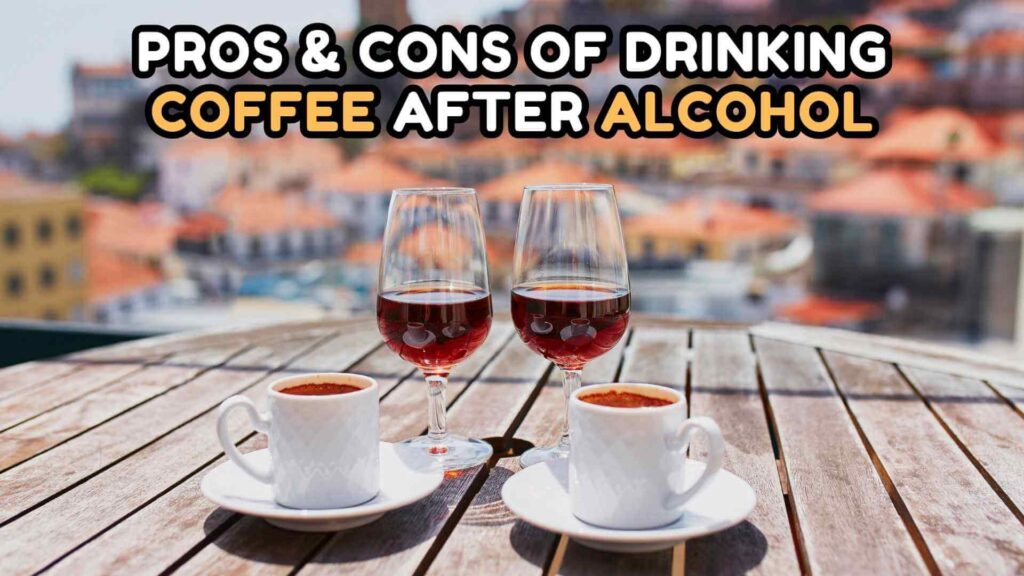
Does Drinking Coffee After Alcohol Pose Any Risks? Understanding the Effects of Alcohol and Coffee
Alcohol: The Depressant
Before we explore how coffee interacts with alcohol, it’s important to understand how alcohol affects your body:
- Alcohol as a CNS Depressant: Alcohol is a central nervous system depressant. It slows down brain activity, leading to:
- Impaired judgment
- Slurred speech
- Decreased coordination
- Dehydration Effects: Alcohol increases urination and leads to dehydration, which contributes to many hangover symptoms like headaches, dizziness, and fatigue.
- Sleep Disruption: Although alcohol can help you fall asleep, it disrupts the quality of sleep, preventing you from entering deep stages of rest.
Coffee: The Stimulant
Now, let’s turn to coffee and its impact:
- Caffeine as a CNS Stimulant: Coffee contains caffeine, a stimulant that temporarily boosts energy levels and alertness by:
- Blocking adenosine receptors, which normally signal to your body that it’s time to sleep
- Increasing dopamine production, which enhances your mood and mental focus
- Energy Boost: The central nervous system is stimulated, leading to improved focus, quicker reaction times, and enhanced physical performance.
While coffee can make you feel more energetic, it doesn’t reverse the depressant effects of alcohol.
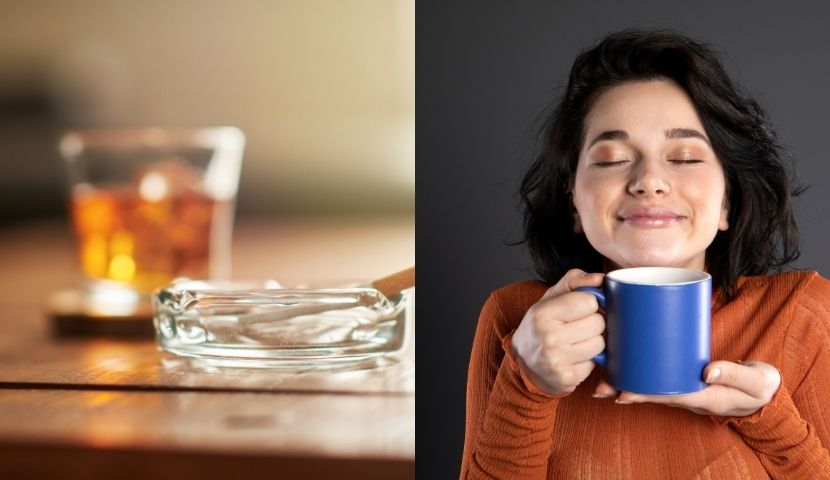
The Pros of Drinking Coffee After Alcohol
While there are potential downsides, coffee also brings some benefits when consumed after alcohol:
1. Temporary Alertness Boost
- How It Works: After drinking alcohol, you might feel groggy and fatigued. A cup of coffee can boost your alertness and help you feel awake, which might be beneficial if you need to get up and work or focus on something important.
- The Caveat: This boost is temporary and doesn’t address the underlying causes of fatigue from alcohol. You may feel awake but still be impaired.
2. Masking Hangover Fatigue
- Caffeine’s Role: The stimulating effects of coffee can mask the fatigue associated with hangovers. While the fatigue is still there, you might feel like you can keep going.
- Temporary Relief: The feeling of energy from coffee doesn’t solve dehydration or liver stress caused by alcohol, but it can help you function at a higher level for a short period.
3. Potential Headache Relief
- Vasoconstriction: Caffeine has vasoconstrictive properties, meaning it can narrow blood vessels, which may reduce the intensity of a headache. For some people, this effect might help ease hangover-related headaches.
- Caution: Not everyone experiences headache relief from coffee, and for some, it could potentially worsen the problem due to gastric irritation or other factors.
The Cons of Drinking Coffee After Alcohol
While the benefits of drinking coffee after alcohol may seem tempting, there are significant downsides to this combination:
1. Dehydration Exacerbation
- Double Diuretics: Both alcohol and caffeine are diuretics, meaning they promote the production of urine, which leads to increased dehydration.
- Impact on Hydration: Dehydration is one of the main causes of hangover symptoms, such as headaches, fatigue, and dizziness. Consuming coffee after drinking alcohol can worsen these symptoms, as it further contributes to fluid loss from the body.
2. Sleep Disruption
- Alcohol and Sleep: Alcohol disrupts sleep by reducing REM sleep and increasing the likelihood of waking up throughout the night.
- Caffeine’s Impact: When you consume caffeine after drinking alcohol, the stimulant effects can disrupt your ability to fall asleep, even if alcohol has made you drowsy.
- Consequences for Recovery: Poor sleep can worsen the hangover and increase the recovery time, as the body needs proper rest to heal from alcohol’s effects.
3. Increased Heart Rate and Blood Pressure
- Cardiovascular Stress: Caffeine raises your heart rate and blood pressure by stimulating the central nervous system. When combined with alcohol, which also impacts the cardiovascular system, it can increase stress on your heart.
- Potential Risks: For individuals with pre-existing heart conditions or high blood pressure, this combination could trigger palpitations or more serious cardiovascular issues.
4. Gastrointestinal Distress
- Stomach Irritation: Both alcohol and coffee are irritants to the gastrointestinal tract. Alcohol can increase acid production in the stomach, while caffeine may cause stomach discomfort or acid reflux.
- Digestive Issues: If you have a sensitive stomach, drinking coffee after alcohol might lead to nausea, gastritis, or intestinal upset, making it harder to recover from your hangover.
Balancing the Effects: Should You Drink Coffee After Alcohol?
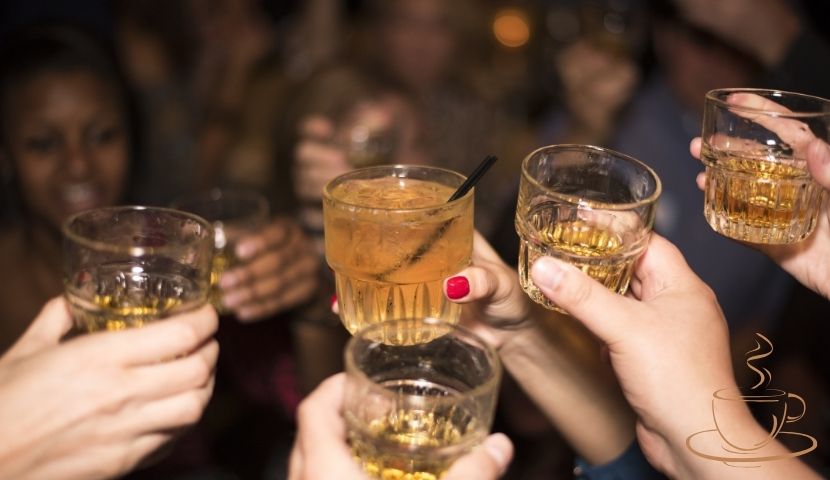
If you’ve had a few drinks and are considering reaching for coffee, there are a few things to keep in mind to balance the effects:
- Hydrate First: Before sipping your coffee, drink water to help replenish lost fluids and alleviate dehydration. This helps reduce the severity of hangover symptoms and counters the dehydrating effects of both alcohol and caffeine.
- Limit Your Coffee Intake: Stick to one cup. Drinking too much coffee can lead to anxiety, jitters, and further dehydration, as well as worsened digestive issues.
- Pay Attention to How Your Body Reacts: Everyone’s body reacts differently to alcohol and caffeine. Monitor your energy levels, sleep patterns, and hydration after consuming both, and adjust your habits accordingly.
Scientific Insights on Alcohol and Coffee Interaction
1. Alcohol Metabolism and Caffeine
- Liver Function: Alcohol is processed by the liver, and the body metabolizes it at a fixed rate. No amount of caffeine can speed up this process. Research shows that caffeine doesn’t accelerate alcohol metabolism. If you’re hoping for coffee to “sober you up,” you’re mistaken—only time can clear alcohol from your system.
2. Caffeine and Alcohol: A Dangerous Mix
- Masking Alcohol’s Effects: Caffeine can make you feel more alert, which might cause you to drink more alcohol, not realizing the sedative effects it still has. This leads to an increased risk of alcohol poisoning or overconsumption.
- Increased Alcohol Absorption: Some studies suggest that consuming caffeine with alcohol may also increase alcohol absorption, leading to quicker intoxication and greater impairment.
Conclusion: Is Coffee After Alcohol a Good Idea?
As coffee lovers, it’s tempting to reach for a caffeine boost after alcohol consumption. While coffee can temporarily alleviate some hangover symptoms like fatigue, it does not counteract alcohol’s effects on your body. If you choose to have coffee after alcohol, remember:
- Drink plenty of water to stay hydrated.
- Avoid excessive caffeine consumption.
- Monitor your body’s response and adjust accordingly.
In moderation, coffee can offer a brief energy boost, but it is important to understand that it won’t resolve the long-term effects of alcohol consumption. Always listen to your body and prioritize recovery with proper hydration and rest.
Additional Tips for Post-Alcohol Recovery
- Eat a Balanced Meal: Eating a nutritious meal can help stabilize your blood sugar levels and provide essential vitamins and minerals.
- Take It Easy: Don’t rush back into intense physical activities after drinking. Your body needs time to recover.
- Consider Electrolyte Drinks: Electrolyte drinks can help replenish lost minerals and hydrate your body more effectively than water alone.
Frequently Asked Questions
Can alcohol and caffeine kill you?
While the combination of alcohol and caffeine is unlikely to be directly fatal, it can significantly increase health risks. Caffeine can mask the depressant effects of alcohol, leading individuals to consume more alcohol than intended, which increases the risk of alcohol poisoning.
Both substances are diuretics, leading to dehydration, and their combined use can strain the cardiovascular system, potentially leading to arrhythmias or other heart-related issues. Therefore, while not directly lethal, the combination can contribute to life-threatening situations if abused.
How long after drinking coffee can I drink alcohol?
There is no specific waiting period required between drinking coffee and consuming alcohol. However, it’s important to note that caffeine does not speed up the metabolism of alcohol. The liver processes alcohol at a constant rate, and consuming caffeine will not accelerate this process.
Therefore, it’s advisable to wait until the effects of alcohol have worn off before consuming more alcohol, regardless of caffeine intake.
Does drinking coffee after drinking alcohol increase blood alcohol content (BAC)?
No, drinking coffee after consuming alcohol does not increase your BAC. Caffeine may make you feel more alert, but it does not affect the rate at which your body metabolizes alcohol. The only way to reduce BAC is through time, allowing the liver to process the alcohol.
Can drinking coffee after drinking alcohol help me pass a DMV driving test?
No, drinking coffee after consuming alcohol will not help you pass a DMV driving test if you’re still impaired. Caffeine may reduce feelings of drowsiness but does not eliminate alcohol’s effects on coordination, reaction time, or judgment. If your BAC is above the legal limit, you’re still considered impaired, regardless of caffeine consumption.
What are the effects of combining caffeine and alcohol on the heart?
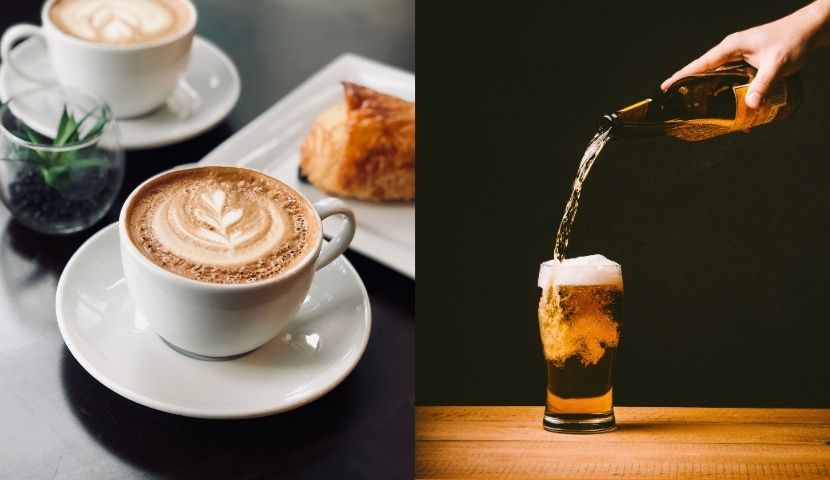
Combining caffeine and alcohol can have several effects on the heart:
- Increased heart rate and blood pressure: Caffeine stimulates the heart, while alcohol can cause blood vessels to dilate, leading to fluctuations in heart rate and blood pressure.
- Risk of arrhythmias: Both substances can affect the electrical activity of the heart, increasing the risk of irregular heartbeats.
- Potential for heart strain: The combined stimulant and depressant effects can strain the cardiovascular system, especially in individuals with pre-existing heart conditions.
What are the benefits of quitting coffee and alcohol?
Quitting coffee and alcohol can lead to numerous health benefits:
- Improved sleep quality: Both substances can disrupt sleep patterns; eliminating them can lead to deeper, more restful sleep.
- Reduced anxiety and stress: Caffeine and alcohol can both contribute to anxiety; abstaining can help stabilize mood.
- Better hydration: Both are diuretics, leading to dehydration; quitting helps maintain proper fluid balance.
- Enhanced liver function: The liver processes both substances; reducing intake allows it to function more efficiently.
- Lower risk of chronic diseases: Long-term use of both can increase the risk of various health issues; quitting reduces these risks.
Is it safe to consume alcohol and caffeine together?
Consuming alcohol and caffeine together is not recommended. Caffeine can mask the depressant effects of alcohol, leading individuals to consume more alcohol than intended, increasing the risk of alcohol poisoning.
Both substances are diuretics, leading to dehydration, and their combined use can strain the cardiovascular system. Therefore, it’s best to avoid combining the two.
What are the effects of caffeine and alcohol on the body?
Caffeine and alcohol have opposing effects on the body:
- Caffeine: A stimulant that increases alertness, heart rate, and blood pressure.
- Alcohol: A depressant that slows brain function, impairs coordination, and can lead to drowsiness.
When consumed together, caffeine can mask alcohol’s depressant effects, leading to increased alcohol consumption and a higher risk of alcohol-related harm.
Can drinking coffee after alcohol help with hangovers?
Drinking coffee after alcohol may provide a temporary boost in alertness, but it does not cure a hangover. Caffeine can exacerbate dehydration, a primary cause of hangover symptoms, and may irritate the stomach lining, worsening nausea. The best remedy for a hangover is time, hydration, and rest.
Are there any safe ways to combine caffeine and alcohol?
If you choose to consume both, moderation is key. Limit caffeine intake to avoid overstimulation and potential heart issues. Be aware of how your body responds and avoid situations where you might be tempted to drive or operate machinery. Always prioritize safety and be mindful of the potential risks.
Note: This blog post is intended for informational purposes only and should not replace professional medical advice. Always consult a healthcare provider for concerns related to alcohol and caffeine consumption.

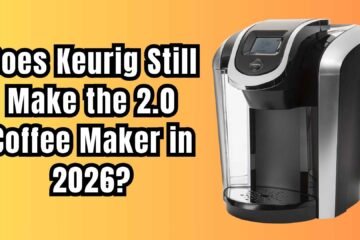

0 Comments